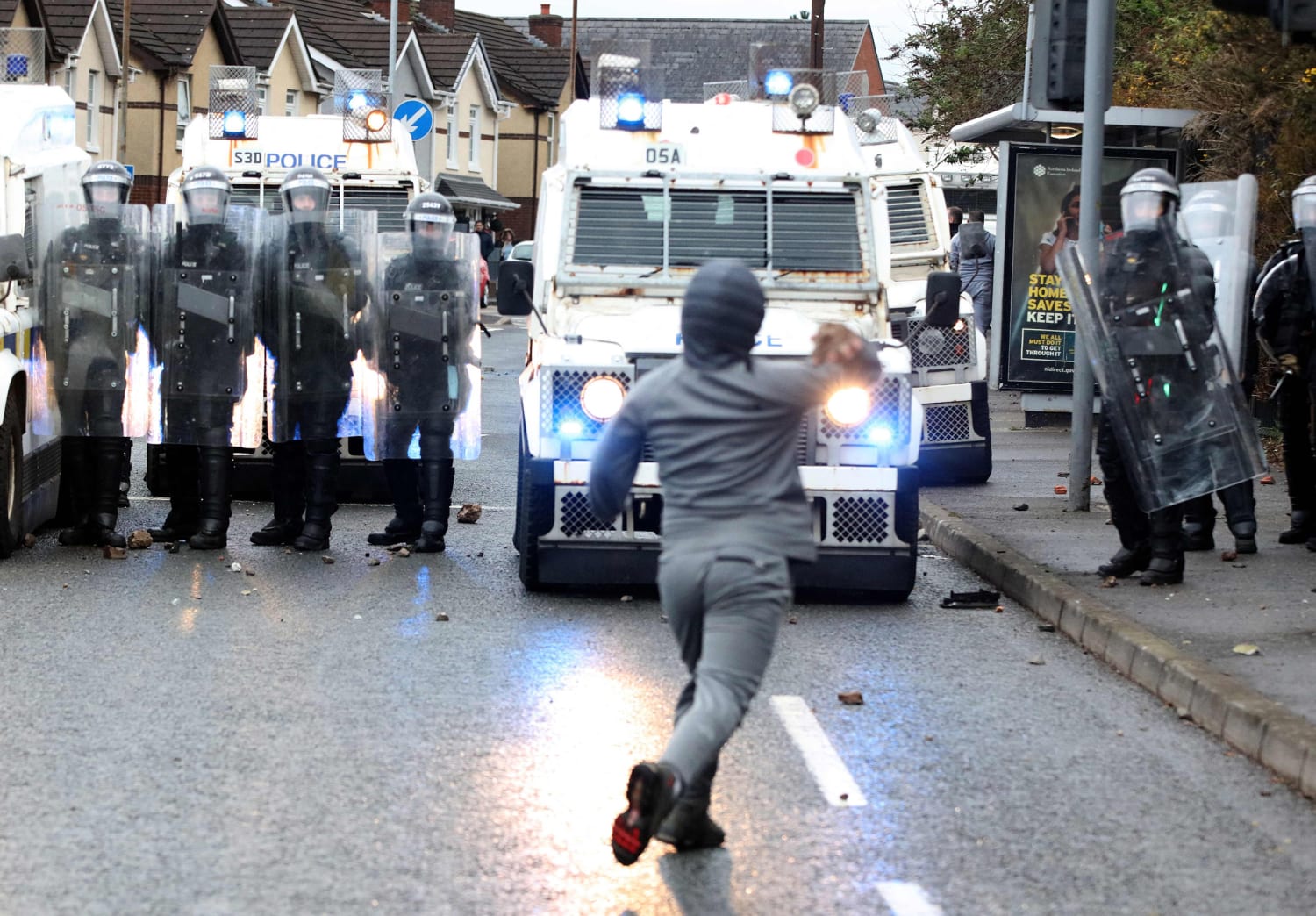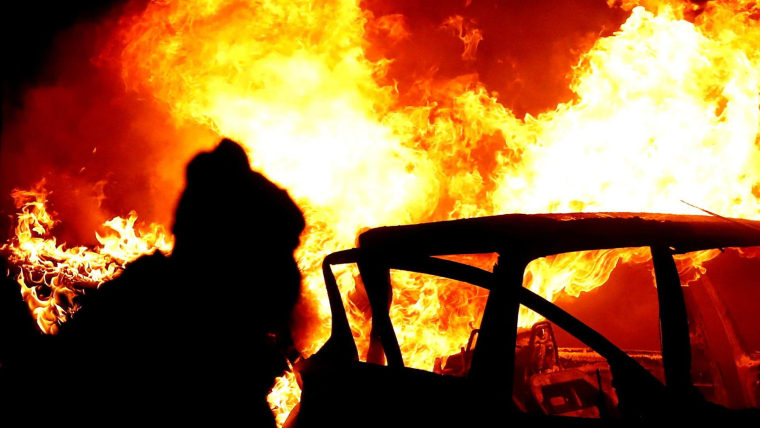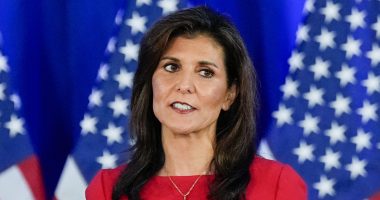BELFAST, Northern Ireland — The violence that has spread across Northern Ireland this month, from the cities of Londonderry and Belfast to smaller towns, has been a stark reminder that this corner of the United Kingdom remains bitterly divided along political and cultural lines.
Night after night, rioters in loyalist areas have hurled bricks and gasoline bombs at police, who responded with water cannons. So far, almost 90 officers have been injured. Dissident republican groups such as the New IRA have also moved to renew a bombing campaign aimed at intimidating the police force. On April 19, a bomb was discovered outside the home of a female officer near the town of Dungiven.
To many observers, the violence recalls the conflict known as “The Troubles,” which for three decades pitted pro-British loyalists and unionists against Irish nationalists who wanted Northern Ireland to break free from the United Kingdom and unite with the independent Republic of Ireland.
More than 3,600 people died during that conflict, and tens of thousands were injured. Despite the vast majority of Northern Irish people wanting peace, the era came to be defined by violence and unrest, punctuated by frequent bombings, rioting, attacks on police, sectarian murders and army crackdowns.
Since the 1998 Good Friday agreement, the conflict no longer involves paramilitary factions using bombs and bullets to further their cause. However, the agreement was just one step in a stuttering, ongoing peace process, and tensions have continued to simmer, fueled by a perception among loyalists that their culture and identity are being eroded.
Those frustrations reached a boiling point this year, following tense negotiations between the European Union and the British government over how to implement Brexit, loyalist activists in Belfast told NBC News.
Download the NBC News app for breaking news and politics
The United Kingdom consisting of Great Britain and Northern Ireland remains one country. Under the terms of the Brexit deal, however, Northern Ireland will continue to be subject to the E.U.’s trade and customs rules.
That decision — known as the Northern Ireland Protocol — was designed to avoid creating a hard economic border between Northern Ireland and the Irish Republic. Irish and European leaders repeatedly warned that hardening the border could lead to violence. Instead, customs checks will be imposed on goods crossing the Irish Sea into Northern Ireland.
Unionists believe the British government has prioritized the interests of Irish nationalists, however, leaving them feeling betrayed and cut adrift.
“Northern Ireland is being torn away from the United Kingdom on the basis of nationalist threats of violence,” loyalist activist Jamie Bryson said. “I mean a child can understand that.”
Anger has grown since the terms of the Brexit deal went into effect at the start of this year. Then in March, the Loyalist Communities Council, an umbrella organization giving political representation to several loyalist paramilitary groups, officially withdrew its support for the Good Friday agreement. Loyalist community workers have refused to help the police prevent illegal gatherings.
“People in loyalist communities feel that their identity is always under threat,” activist Stacey Graham said. “Now we have the protocol, and they’re feeling like they’re not equal citizens like the rest of the U.K., and I think it’s just reached a boiling point.”
In addition to the grievances over Brexit, loyalists frequently accuse law enforcement of “two-tier policing” — alleging that the Police Service of Northern Ireland, much like the British government, now treats loyalists more harshly than nationalists.
This belief is strongly disputed by nationalists and the police themselves, but was compounded when prosecutors recently decided not to press charges against leaders of the Irish republican Sinn Fein party, who were among thousands of people to attend the funeral of former Provisional IRA leader Bobby Storey in apparent violation of coronavirus restrictions against mass gatherings.
“There’s a pattern of pacifism towards Republicans and in particular Sinn Fein,” Moore Holmes, a loyalist activist in east Belfast, said. “There’s never been a more obvious and clear example of that than Bobby Storey’s funeral.”
Sam McBride, political editor of the unionist-leaning newspaper Belfast News Letter, said the handling of the Storey funeral undermined support for the police, but he didn’t view it as part of a larger campaign of police favoritism.
“I don’t think it’s fair to characterize those mistakes as evidence of bias because they’ve been mistakes that actually straddled both sides of the community,” he said. “Some of this is about politics, but some of it is also about the consequences of just bad decisions by the police.”
Dolores Kelly, a prominent member of the nationalist Social Democratic and Labour Party, and a member of the Policing Board that oversees the activity of the Police Service of Northern Ireland, said recent independent inspections of the police force did not identify biased treatment of loyalist communities. But she was also critical of nationalists who attended the Storey funeral.
“I do think that Sinn Fein, and the republican movement in particular, have serious questions to answer in relation to their judgment and how they felt they were above everybody else in both the spirit and the law of Covid restrictions,” she said.
For his part, Chief Constable Simon Byrne has defended the police’s record and insisted police handling of the funeral was impartial.
On top of the political factors underpinning loyalist anger, there are also concerns that paramilitary groups may have helped instigate some of the violence in order to retain control of certain areas.
News reports have highlighted older men dropping off young people at trouble spots in their cars, and video clips on social media appear to show adults cheering on the young rioters.
Allison Morris, crime correspondent for the Belfast Telegraph, said the riots in the town of Newtownabbey, for example, may benefit drug dealing operations run by a faction of the paramilitary Ulster Defence Association, which had faced a crackdown by the local police and Britain’s National Crime Agency.
“They think if they riot, they can turn their area into a no-go zone for community police,” she said. “Community police are the ones who pick up information on these people.”
Under the grip of shadowy paramilitary groups, and finding themselves consistently outmanoeuvred politically by Irish nationalists, loyalists also feel let down by their own elected representatives, who along with almost all mainstream political figures have condemned the rioting while voicing many of the same concerns.
“It’s just empty words on the media, on the radio, on TV, and they’re not really engaging with the local people on the ground,” Graham said.
According to McBride, the leading party of loyalism and unionism, the Democratic Unionist Party, has been at the center of power for so long that it has “grown detached from some of its roots” as the anti-establishment, left-of-center force it used to be.
The death of Prince Philip on April 9 has almost entirely paused the violence for now, as the United Kingdom observes a period of national mourning. But summer in Northern Ireland is often a season of unrest, as loyalist and unionist marching bands traditionally parade through the streets. Already there are concerns over what the next few weeks and months will bring, as younger loyalists itch to make their presence felt.
“You have the hawks and the doves,” Morris said. “You have the older men who went to prison, men who went through The Troubles, have lost people and clearly don’t want a return to the past. Then you have the younger people who want to take a much more hardline approach.
“It doesn’t take a majority to destroy the peace, it only takes a minority — 1,000 people could bring this place to a standstill.”
Source: | This article originally belongs to Nbcnews.com











